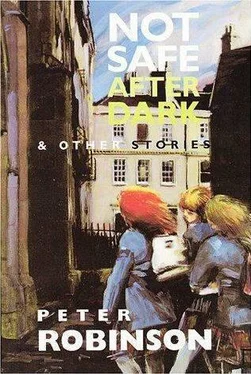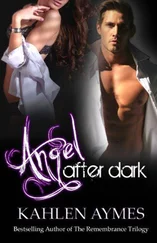‘But Sergeant Longbottom said she might have interrupted a burglar.’
I sniffed. ‘Sergeant Longbottom’s an idiot. There was no evidence at all that her killer was attempting to burgle the place.’
‘Maybe she was one of them once – a gypsy – and they came to take her back?’
I laughed. ‘I must say, Harry, you certainly don’t lack imagination, I’ll grant you that. But no, I rather fancy this is a different sort of matter altogether.’
Harry frowned. ‘You’re not off on one of your Sherlock Holmes kicks again, are you, Frank? Leave it be. Let the professionals deal with it. It’s what they’re paid for.’
‘ Professionals! Hmph. You saw for yourself how interested our Detective Sergeant Longbottom was. Interested in crawling back in his bed, more like it. No, Harry, I think that’s the last we’ve seen of them. If we want to find out who killed poor Maggie, we’ll have to find out for ourselves.’
‘Why not just let it be, Frank?’ Harry pleaded. ‘We’re at war. People are getting killed every minute of the day and night.’
I gave him a hard look, and he cringed a little. ‘Because this is different, Harry. While I can’t say I approve of war as a solution to man’s problems, at least it’s socially sanctioned murder. If the government, in all its wisdom, decides that we’re at war with Germany and we should kill as many Germans as we can, then so be it. But nobody sanctioned the killing of Mad Maggie. When an individual kills someone like Maggie, he takes something he has no right to. Something he can’t even give back or replace, the way he could a diamond necklace. It’s an affront to us all, Harry, an insult to the community. And it’s up to us to see that retribution is made.’ I’ll admit I sounded a little pompous, but Harry could be extremely obtuse on occasion, and his using the war as an excuse for so outrageous a deed as Rose’s murder brought out the worst in me.
Harry seemed suitably cowed by my tirade, and when he’d finished his brandy he shuffled off to finish his deliveries. I never did ask him whether there was any milk left on his unattended float.
•
I had another hour in which to enjoy my morning tea before I had to leave for school, but first I had to complete my ritual and drop by the newsagent’s for a paper. While I was there, I asked Mrs Hope behind the counter when she had last seen Mad Maggie. Last Wednesday, she told me, walking down the street towards her house just before the warning siren went off, muttering to herself. That information, along with the unopened milk and the general state of the body, was enough to confirm for me that Rose had probably been killed under cover of the air raid.
That morning, I found I could neither concentrate on Othello , which I was supposed to be teaching the fifth form, nor could I be bothered to read about the bombing raids, evacuation procedures and government pronouncements that passed for news in these days of propaganda and censorship.
Instead, I thought about Mad Maggie, or Rose Faversham, as she had now become for me. When I tried to visualize her as she was alive, I realized that had I looked closely enough, had I got beyond the grim expressions and the muttered curses, I might have seen her for the handsome woman she was. Handsome , I say, not pretty or beautiful, but I would hazard a guess that twenty years ago she would have turned a head or two. Then I remembered that it was about twenty years ago when she first arrived in the neighbourhood, and she had been Mad Maggie right from the start. So perhaps I was inventing a life for her, a life she had never had, but certainly when death brought repose to her features, it possessed her of a beauty I had not noticed before.
When I set off for school, I saw Tommy Markham, Harry’s stepson, going for his morning constitutional. Tommy’s real dad, Lawrence Markham, had been my best friend. We had grown up together and had both fought in the Third Battle of Ypres, between August and November 1917. Lawrence had been killed at Passchendaele, about nine miles away from my unit, while I had only been mildly gassed. Tommy was in his mid twenties now. He never knew his real dad, but worshipped him in a way you can worship only a dead hero. Tommy joined up early and served with the Green Howards as part of the ill-fated British Expeditionary Force in France. He had seemed rather twitchy and sullen since he got back from the hospital last week, but I put that down to shattered nerves. The doctors had told Polly, his mother, something about nervous exhaustion and about being patient with him.
‘Morning, Tommy,’ I greeted him.
He hadn’t noticed me at first – his eyes had been glued to the pavement as he walked – but when he looked up, startled, I noticed the almost pellucid paleness of his skin and the dark bruises under his eyes.
‘Oh, good morning, Mr Bascombe,’ he said. ‘How are you?’
‘I’m fine, but you don’t look so good. What is it?’
‘My nerves,’ he said, moving away as he spoke. ‘The doc said I’d be all right after a bit of rest, though.’
‘I’m glad to hear it. By the way, did your fath-, sorry, did Harry tell you about Mad Maggie?’ I knew Tommy was sensitive about Harry not being his real father.
‘He said she was dead, that’s all. Says someone clobbered her.’
‘When did you last see her, Tommy?’
‘I don’t know.’
‘Since the raid?’
‘That was the day after I got back. No, come to think of it, I don’t think I have seen her since then. Terrible business, in’it?’
‘Yes, it is.’
‘Anyway, sorry, must dash. Bye, Mr Bascombe.’
‘Bye, Tommy.’
I stood frowning and watched him scurry off, almost crabwise, down the street.
•
There was another air raid that night, and I decided to look for Fingers Finnegan. By then I had talked to enough people on the street to be certain that no one had seen Rose since the evening of the last raid.
We lived down by the railway, the canal and the power station, so we were always copping it. The Luftwaffe could never aim accurately, though, because the power station sent up clouds of appalling smoke as soon as they heard there were enemy planes approaching. If the bombs hit anything of strategic value, it was more by good luck than good management.
The siren would go off, wailing up and down the scale for two minutes, and it soon became an eerie fugue as you heard the sirens from neighbouring boroughs join in, one after another. The noise frightened the dogs and cats and they struck up, wailing and howling, too. At first, you could hardly see a thing outside, only hear the droning of the bombers high above and the swishing and whistling sound of the bombs as they fell in the distance. Then came the explosions, the hailstone of incendiaries on roofs like a rain of fire, the flames crackling, blazing through the smoke. Even the sounds seemed muffled, the distant explosions no more than dull, flat thuds, like a heavy book falling on the floor, the crackle of anti-aircraft fire like fat spitting on a griddle. Sometimes you could even hear someone scream or shout out a warning. Once I heard a terrible shrieking that still haunts my nightmares.
But the city had an eldritch beauty during an air raid. In the distance, through the smoke haze, the skyline seemed lit by a dozen suns, each a slightly different shade of red, orange or yellow. Searchlights criss-crossed one another, making intricate cat’s cradles in the air, and ack-ack fire arced into the sky like strings of Christmas lights. Soon, the bells of the fire engines became part of the symphony of sound and colour. The smoke from the power station got in my eyes and up my nose, and with my lungs, it brought on a coughing fit that seemed to shake my ribs free of their moorings. I held a handkerchief to my face, and that seemed to help a little.
Читать дальше










![Джеймс Чейз - Not Safe to Be Free [= The Case of the Strangled Starlet]](/books/417649/dzhejms-chejz-not-safe-to-be-free-the-case-of-the-thumb.webp)

